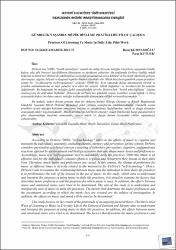Gündelik yaşamda müzik dinleme pratikleri; Pilot çalışma
Citation
Kumpasoğlu, B. B. & Kutluk, F. (2022). GÜNDELİK YAŞAMDA MÜZİK DİNLEME PRATİKLERİ; PİLOT ÇALIŞMA . Afyon Kocatepe Üniversitesi Akademik Müzik Araştırmaları Dergisi , CİLT VIII - ÖZEL SAYI , 431-442 .Abstract
DeNora’nın (2000) “benlik teknolojisi” olarak ele aldığı kavram, müziğin bireylerin yaşamında kimlik, hafıza, algı gibi bireysel özerkliklerini düzenleme ve sürdürme çabasıdır. Bu bağlamda DeNora kişiliği, müzik beğenisi ve müzik tercihlerini de şekillendiren ve kişiliği genel olarak sosyo-kültürel ve biyolojik etkenlerle gelişen, davranışlar, algılar, bilişsel ve duygusal tepkiler bütünü olarak ele alır. Müzik bireylerin gündelik yaşam pratikleri içinde bir “öz-düzenleme (self-regulation)” aracıdır (2000:46). Aynı zamanda duygu durumlarını sürekli ve yeniden anlamlandırma ve inşa çabaları için etkin bir araçtır. Müzik beğenileri ve tercihleri de bu nedenle değişkendir. Bu bağlamda bir müziğin farklı zamanlardaki tercihi, DeNora’nın “benlik teknolojisinin” oluşma motivasyonu ile doğrudan ilişkilidir. Dolayısıyla DeNora’nın gündelik yaşam pratikleri içinde müzik ve birey arasındaki ilişkiyi inceleme amacı, müziğin kullanımında dinleyicinin rolünü sorunsallaştırmaktır. Bu makale, halen devam etmekte olan bir doktora tezinin (Duygu Durumu ve Kimlik Bağlamında Gündelik Yaşamda Müzik Dinleme Biçimleri) pilot çalışma sonuçlarına odaklanmaktadır. Gündelik yaşam pratikleri içinde müziğin kullanım amaçlarını anlama ve yorumlamayı hedeflemekte, müzik ve duygu durumlar arasındaki etkiler incelenmektedir. Müzik tercihlerini belirleyen etkenler, müzik listelerinin hangi parametrelere göre oluşturulduğu inceleme konusudur. Ayrıca müzik ve duygu durum üzerindeki etkiler saptanmaya çalışılacaktır. According to DeNora (2000), "self-technology" refers to the efforts of music to regulate and maintain the individual's autonomy, including identity, memory and perception. In this context, DeNora considers personality as a broad concept consisting of behaviors, perceptions, cognitive, and emotional reactions affected by socio-cultural and biological factors that also shape music tastes and preferences. Accordingly, music is a "self-regulation" tool in individuals' daily life practices (2000:46). Music is an effective tool for the individual's constant efforts to regulate and reinterpret their moods in their daily lives. Therefore, music tastes and preferences are varied. In this context, the change of preference for music at different times is directly related to the motivation for DeNora's "self-technology". Hence, DeNora's aim to examine the relationship between music and the individual in their daily life practices is to problematize the role of the listener in the use of music. In this study, which aims to understand and interpret the purposes of using music in daily life practices, it is aimed to examine the factors that determine music preferences and the purposes for which music is used. In addition, the effects between music and emotional states were tried to be determined. The aim of this study is to understand and interpret the uses of music in daily life practices. The factors that determine the music preferences and the parameters according to which the music lists are created are the subject of investigation. In addition, the effects on music and mood will be tried to be determined. This study focuses on the results of the pilot study of an ongoing doctoral thesis. The thesis titled Ways of Listening to Music in Everyday Life in the Context of Emotion and Identity aims to understand and interpret the purposes of using music in daily life practices. In addition, the effects between music and emotional states were tried to be determined. The factors that determine the music preferences and the parameters according to which the music lists are created are the subject of investigation. In addition, the effects on music and mood will be tried to be determined.



















